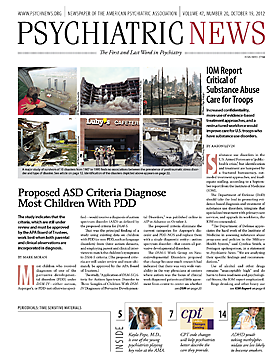Substance use disorders in the U.S. Armed Forces are a “public-health crisis,” but identification and treatment are hampered by a fractured bureaucracy, outmoded treatment approaches, and inadequate staffing, according to a September report from the Institute of Medicine (IOM).
The Department of Defense (DoD) should take the lead in promoting evidence-based diagnosis and treatment of substance use disorders, integrate that specialized treatment with primary care services, and upgrade its workforce, the IOM recommended.
“The Department of Defense appreciates the hard work of the Institute of Medicine in assessing substance abuse programs and policies in the Military Health System,” said Cynthia Smith, a Pentagon spokesperson, in a statement to Psychiatric News. “We are analyzing their specific findings and recommendations.”
Use of alcohol and other drugs remains “unacceptably high” and do harm to force readiness and psychological fitness, the IOM report emphasized.
Binge drinking and other heavy use of alcohol have increased since the start of the wars in Iraq and Afghanistan, the IOM noted, and prescriptions by military doctors for pain medications quadrupled to 3.8 million from 2001 to 2009.
“[T]he highest levels of military leadership must acknowledge these alarming facts and combat them using an arsenal of public-health strategies, including proactively attacking substance use problems before they begin by limiting access to certain medications and alcohol,” concluded the IOM panel, chaired by Charles O’Brien, M.D., a professor and vice chair of psychiatry and director of the Center for Studies of Addiction at the University of Pennsylvania.
The panel praised the DoD for making an effort to improve prevention and treatment of substance use disorders, but found the results less than adequate. A joint VA/DoD clinical practice guideline for treating substance use disorders was published in 2009.
“The VA is following the guidelines, but I do not know why the DoD is not,” said O’Brien.
TRICARE, the DoD’s civilian contractor for health care for military service members and their families, uses “out-of-date” treatment paradigms dating to the 1970s and 1980s, thanks to congressionally mandated regulations, said panel member Dennis McCarty, Ph.D., a professor of public health and preventive medicine at the Oregon Health Sciences University in Portland.
“There is too much use of inpatient treatment at substance abuse rehabilitation facilities and underutilization of outpatient services,” said McCarty as the report was being released.
The panel also criticized the minimal use of pharmacological treatments. “Modern treatment of substance abuse disorders involves medications,” said O’Brien.
One exception was the Army’s Confidential Alcohol Treatment and Education Pilot or CATEP, “which demonstrated that active-duty service members use confidential treatment when given the opportunity to do so.”
Providing care without involving the chain of command or disciplinary action “promotes better care, builds troop resilience, and encourages individuals to seek help rather than hide problems,” the report stated.
The report went beyond the usual exhortations to hire more clinicians. It urged the service branches to restructure their substance use disorder counseling workforces, relying less on “individuals in recovery” and certified drug and alcohol counselors.
The services should use “physicians and other licensed independent practitioners to lead and supervise multidisciplinary treatment teams providing a full continuum of behavioral and pharmacological therapies to treat [substance use disorders] and comorbid mental health disorders,” the report stated. “Emphasizing outpatient services, relying on group therapy, and using computer-assisted cognitive-behavioral training may help to increase caseloads and enhance productivity.”
The DoD has increased screening for substance use disorders and tries to place behavioral health practitioners in primary care clinics, said Smith. “A DoD policy governing substance use disorder treatment is now in coordination, which further specifies the certification standards for drug and alcohol counselors.”


